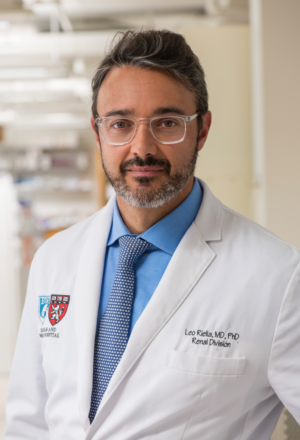
Vikas Dharnidharka, MD, MPH, director of Pediatric Nephrology, Hypertension and Pheresis at Washington University School of Medicine, and Leonardo V. Riella, MD, PhD, director of Kidney Transplantation at Massachusetts General Hospital, have been awarded a pilot grant from the Children’s Hospital of Philadelphia (CHOP) Pediatric Center of Excellence in Nephrology (PCEN) to study focal segmental glomerulosclerosis (FSGS) after kidney transplant in children.
Primary, or idiopathic, FSGS is the most common cause of glomerulonephritis-related end-stage kidney disease (ESKD) in the United States and is thought to be due to an unknown circulating factor. Recurrence of primary FSGS is a significant issue in pediatric renal transplantation, leading to significant morbidities and accelerated loss of the kidney transplant.
Management of recurrent FSGS post-transplant is extremely challenging in part because there is no established standard treatment for the disease. Various therapeutic regimens used to induce remission include therapeutic plasma exchange (TPE, or plasmapheresis), monoclonal antibodies to CD20, and fusion Ig products of the CTLA4 molecule that block the CD28-B7 costimulatory pathway are used to induce remission. However, these treatments are applied with a wide variability in timing and dosing.

Dharnidharka and Riella will use the one-year, $50,000 grant to gather data to better define an effective treatment for recurrent FSGS. Using PCEN’s Learning Health System Core and the associated PEDSnet database of > 8 million records, they will test the hypothesis that a greater cumulative number of TPE sessions is associated with higher rates of complete remission of recurrent FSGS. They will also investigate if, in patients who do not achieve a complete remission with TPE alone, the use of TPE + anti-CD20 Abs is associated with a greater rate of partial remission than the use of TPE + costimulatory blockade (CTLA4Igs).
This pilot project will form the largest multi-center collection of data from the relatively rare pediatric recurrent FSGS and non-recurrent FSGS cases. The plan is to design a multi-center, prospective randomized trial of the two treatment combinations that have the most efficacy in the PEDSnet recurrent FSGS cohort.
Follow Drs. Dharnidharka and Riella, WashU Nephrology and PEDSnet on Twitter: @Vikas_R_D, @LVRiella, @WUNephrology, @PEDSnet.